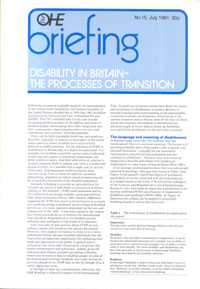Following a proposal originally made by the representative of the Libyan Arab Jamahiriya, the General Assembly of the United Nations decided late in 1976 that 1981…
Following a proposal originally made by the representative of the Libyan Arab Jamahiriya, the General Assembly of the United Nations decided late in 1976 that 1981 should be proclaimed the International Year of the Disabled Persons (IYDP). The UN’s intended aims for the…
Following a proposal originally made by the representative of the Libyan Arab Jamahiriya, the General Assembly of the United Nations decided late in 1976 that 1981 should be proclaimed the International Year of the Disabled Persons (IYDP). The UN’s intended aims for the year to include increasing global awareness of the abilities and the needs of disabled people; encouraging their fuller integration into their communities; improving preventative services; and stimulating ‘more positive’ attitudes generally.
There can be little reasonable doubt that such goals are desirable, especially in relation to those parts of the world where questions about disability have received little political or public attention. Yet the relevance of IYDP to disablement in Britain may to a degree be questioned. For example, the problems caused by various types of physical, intellectual and cognitive/emotional impairments can differ widely in nature. And their alleviation or solution is in many instances likely to emerge only after a considerable period of effort. It is possible that a single year of ‘action’ with broad, ill-defined goals could in practice draw attention away from or mask the need for sustained, painstaking, unglamorous labour aimed at improving the lot of each discrete section of the disabled population.
Similarly in helping to provide an open platform for virtually any group or individual to expound on problems relating to ‘the disabled’. IYDP could sometimes add to the confusion in an already complex social and political field. Some authorities (Oliver 1981, Shearer 1980) have suggested that IYDP may prove to be destructive in as much as it could encourage a needlessly passive image of disabled persons as, in a sense, parasites dependent on the care and compassion of the ‘able’. It has been argued in this context that initial uncertainties as to whether the International Year should be designated of or for disabled persons reflected some ambiguity in the minds of its planners.
Such criticisms of and cautions about IYDP are not without content and should not be entirely discounted. However, there appears in balance to them to be fairly widespread feeling amongst disabled individuals that the Year offers an important opportunity for explaining their needs and aspirations to the public in general and to influential, but often sadly ill informed, sub groups like media commentators and politicians. Indeed, given the cold economic climate currently prevailing in Britain, which may threaten to deprive disabled people of some of the limited gains in living standards they made during the previous decade or so, IYDP may in fact be thought of as a rather opportune event.
In the light of these considerations, therefore, this OHE Briefing is offered in support of the International Year. Its goals are to present outline data about the nature and occurrence of disablement in modern Britain; to provide a background understanding of the demographic, social and economic developments which led up to the current situation; and to discuss some of the ways in which social interventions and medical or pharmaceutical advances might in future help lessen the hardships associated with disablement in this and other countries.
